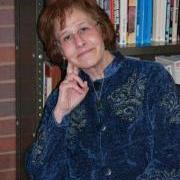|
In 1921, a group of fact-finders were dispatched by the new Bolshevik regime to collect data and artifacts for a museum about the history of Russia’s revolutions, from the Decembrist Revolt of 1825 through the 1917 revolution that led to Communist rule. Trains were sent to different Russian regions to collect materials from town archives, and the fact-finders, who watched as the Russian Civil War continued to rage, eventually returned with their quarry in tow. But plans for the Museum of the Revolution, a pet project of Lenin’s, were put on hold, and eventually discarded. No one gave too much thought to the whereabouts of the documents—until now. Delhi professor Linnea Goodwin Burwood is in Moscow to hunt for that historic Russian treasure trove. Burwood, named as a Fulbright Scholar—Delhi’s first Fulbright winner—in April, is using her $25,000 award to research those train trips, and hopefully gain new insight on the people and places the fact-finders visited. She’s also hoping to track down relatives of the original fact-finders, including those of Russian anarchist Alexander Berkman, the subject of a biography she’s writing. Burwood arrived in Moscow in September and will return to the U.S. in June 2010. “The Ispart committee (charged with supervising the train trips) information is here in Moscow,” Burwood said, in a recent e-mail interview. “Originally, the trains took their information to St. Petersburg. What has happened to the information is part of what I am trying to find out.” Still in awe One thing Burwood is certain of is her lingering shock and delight at being named a Fulbright Scholar—on her first attempt. She said she received invaluable aid from Delhi’s president and administrators throughout the process, which started in July 2008. “I am honored to be Delhi’s first Fulbright Scholar, which allows Delhi the bragging rights it so richly deserves,” she said. “Most scholars who apply for the Fulbright do so at least three times before they are successful and I won the grant the first time. Talk about surprise!” Burwood was sent to the prestigious Moscow State University, where she is assigned to teach and do research. She is also representing SUNY in the Fulbright’s Institute of International Education, which promotes exchange opportunities, summer programs, dual degree diploma programs, faculty collaboration and joint conferences. Looking for clues When she’s not teaching, Burwood is sleuthing. She’s already located a repository of Russian newspapers from 1921, including regional papers that may have reported on the trains. She’s requested documents from the Biblioteka Lenina (the Lenin Library), but what she’ll end up seeing depends on the sensitive nature of the documents, she said. She’s most interested in trains that carried Berkman and Russian anarchist Emma Goldman. Lifelong friends and lovers, the two emigrated to New York City in the 1880s and were deported to Russia under the Anarchist Exclusion Act of 1918. At the time, Berkman and Goldman were considered by J. Edgar Hoover to be two of the most dangerous anarchists in America. “I hope to take photos of where (Berkman) lived in Moscow and St. Petersburg,” she said. “His brother was a pharmacist in Voloyda, not far from Moscow, and I will see if there are any family members still living there and what they know about him.” Burwood discovered her museum mystery in 1997 while doing research on Berkman in Amsterdam. There, she read Berkman’s personal diary, in which he chronicled his trips. “It had little to do with the biography I was working on,” she said. “I simply filed it in the back of my mind thinking these events were interesting. No one has written a monograph about the Museum of the Revolution project, and it is mentioned only in passing in few books, as a committee or a project of Lenin’s.” Making friends Burwood said her spoken Russian is rusty, but that hasn’t stymied her research. While she can understand Cyrillic, the written Russian language, she’s struggling with everyday words and phrases, like knowing the names of food in Russian. “When I open my mouth people know I am not Russian and they are very helpful in correcting my pronunciation and telling me what the appropriate word for something is,” she said. “Russians are very warm and nice people, not the abrupt and unhelpful people that we associate with the old Soviet Union.” — Michael Lisi |
Warning: count(): Parameter must be an array or an object that implements Countable in /home/uuphos5/public_html/voicearchive/wp-includes/class-wp-comment-query.php on line 405


